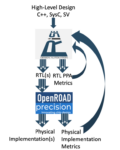In a prior post, I discussed how the clock is no longer just another signal at advanced nodes. Indeed, it is the most critical network on the chip. An optimized clock network can be the margin of victory for your next design. But extracting these benefits is challenging. The clock network is quite sensitive, and optimization can come… Read More
Electronic Design Automation
Cost, Cycle Time, and Carbon aware TCAD Development of new Technologies
Our good friend Scotten Jones wrote a paper on a product that has been in joint development with Synopsys and is now available. Scott is currently President Semiconductor Manufacturing Economics and Senior Fellow at TechInsights. Scott and I have discussed this product many times and I feel it is ground breaking technology for… Read More
3D ESD verification: Tackling new challenges in advanced IC design
By Dina Medhat
Three key takeaways
- 3D ICs require fundamentally new ESD verification strategies. Traditional 2D approaches cannot address the complexity and unique connections in stacked-die architectures.
- Classifying external and internal IOs is essential for robust and cost-efficient ESD protection. Proper differentiation
Reimagining Architectural Exploration in the Age of AI
This is not about architecting a full SoC from scratch. You already have a competitive platform, now you want to add some kind of accelerator, maybe video, audio, ML, and need to explore architectural options for how accelerator and software should be partitioned, and to optimize PPA. Now we have AI to help us optimize you’d like … Read More
S2C, MachineWare, and Andes Introduce RISC-V Co-Emulation Solution to Accelerate Chip Development
MachineWare, and Andes Technology today announced a collaborative co-emulation solution designed to address the increasing complexity of RISC-V-based chip design. The solution integrates MachineWare’s SIM-V virtual platform, S2C’s Genesis Architect and Prodigy FPGA Prototyping Systems, and Andes’ high-performance… Read More
A Webinar About Electrical Verification – The Invisible Bottleneck in IC Design
Electrical rule checking (ERC) is a standard part of any design flow. There is a hidden problem with the traditional approach, however. As designs grow in complexity, whether full-custom analog, mixed-signal, or advanced-node digital, the limitations of traditional ERC tools are becoming more problematic. This can lead to… Read More
Signal Integrity Verification Using SPICE and IBIS-AMI
High-speed signals enable electronic systems by using memory interfaces, SerDes channels, data center backplanes and connectivity in automobiles. Challenges arise from signal distortions like inter-symbol interference, channel loss and dispersion effects. Multi-gigabit data transfer rates in High-Bandwidth Memory… Read More
MZ Technologies Launches Advanced Packaging Design Video Series
In a significant move aimed at empowering semiconductor and systems-design engineers, MZ Technologies has announced the launch of a new video series focused on advanced packaging design. This initiative comes at a time when the semiconductor industry is rapidly shifting toward multi-die, 2.5D/3D integration, heterogeneous… Read More
Superhuman AI for Design Verification, Delivered at Scale
There is a new breed of EDA emerging. Until recently, EDA tools were focused on building better chips, faster and with superior quality of results. Part of that process is verifying and debugging the resultant design. Thanks to ubiquitous AI workloads and multi-chip architectures, the data to be verified and debugged is exploding,… Read More
Radio Frequency Integrated Circuits (RFICs) Generated by AI Based Design Automation
By Jason Liu, RFIC-GPT Inc.
Radio frequency integrated circuits (RFICs) have become increasingly critical in modern electronic systems, driven by the rapid growth of wireless communication technologies (5G/6G), the Internet of Things (IoT), and advanced radar systems. With the desire for lower power consumption, higher… Read More












Advancing Automotive Memory: Development of an 8nm 128Mb Embedded STT-MRAM with Sub-ppm Reliability